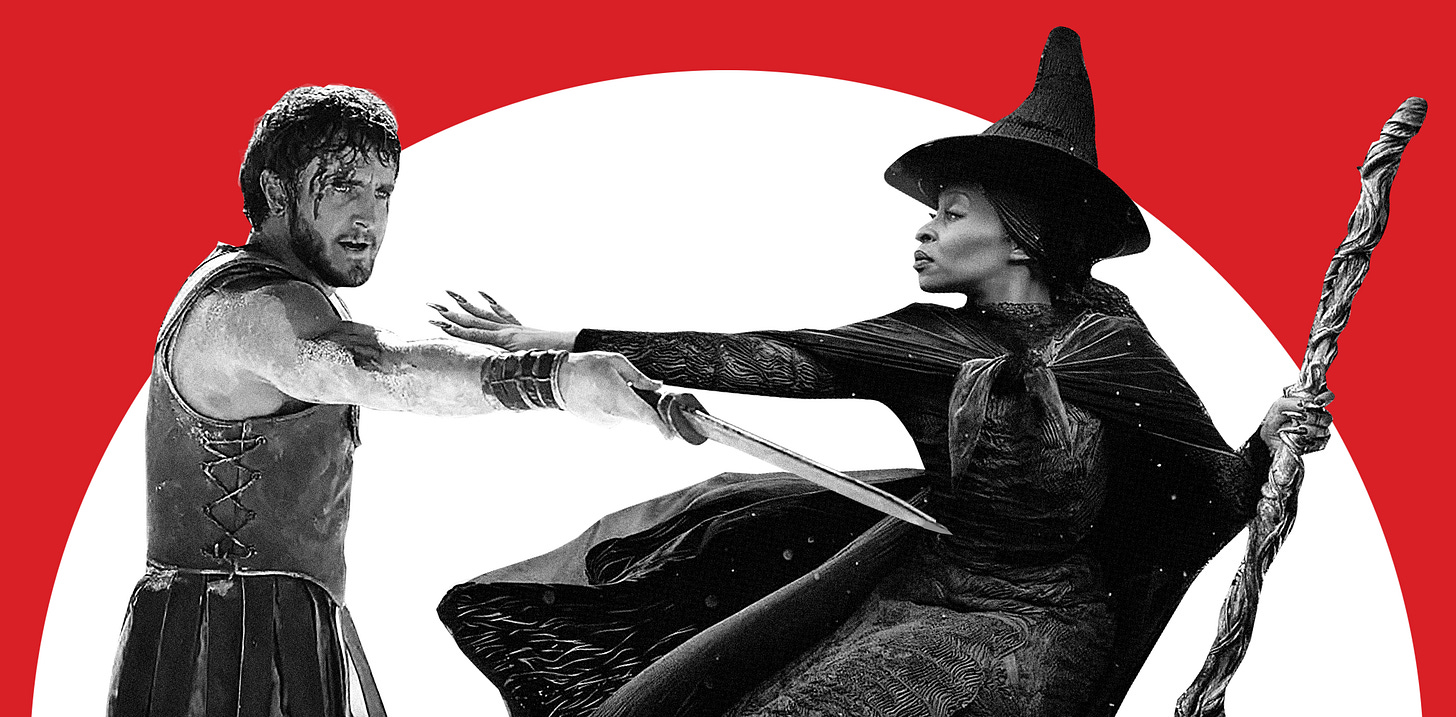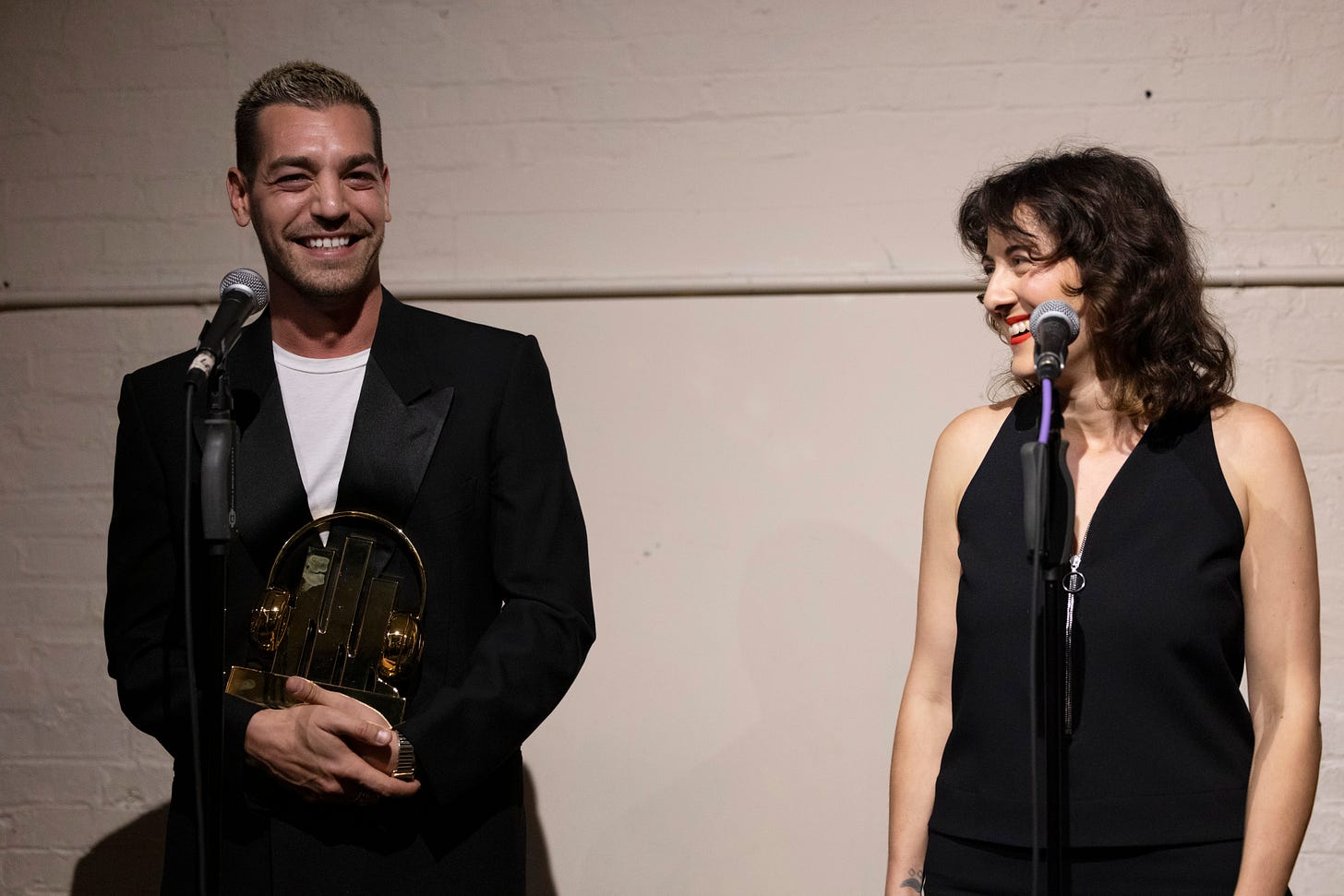'Gladiator II' and 'Wicked' Battle for Perfect Timing
Plus: Days after the 'podcast election,' an awards show for podcasts

A few weeks ago I got to visit, via Zoom, a film class at my alma mater Wesleyan University (thanks to professor Jason Platt Zolov for inviting me!) While explaining how my job works I found myself tangled in an explanation about review embargoes — why do they exist, how studios schedule them — and particularly why are they different from the “social sentiment” embargoes that make this whole situation even more confusing.
When I spoke to the class at the beginning of November I used the example of Gladiator II, which lifted its “social sentiment” embargo immediately after its screening, which is how I was allowed to sing the praises publicly of Denzel Washington weeks ago. Proper critics, on the other hand, had to wait until Monday of this week to publish their more extensive, mixed-to-positive reviews.
We’re now in another waiting period with Wicked, with red-carpet photos of Cynthia Erivo and Ariana Grande lighting up social media alongside some early Letterboxd enthusiasm. Reviews, though, won’t be out there until the 19th, three days before it opens in theaters.
These are all pretty typical patterns for major studio releases, where there’s every incentive in the world to allow friendly members of the press to share their short thoughts on social media, and very little incentive to let critics have a crack until you absolutely have to. But most awards season hopefuls, premiering at film festivals where everyone starts chattering at the same time, never have that advantage.
This gatekeeping is just another way that major tentpoles like Gladiator II and Wicked operate at a different altitude in the awards race, both for better and for worse. Enthusiastic posts from people who are also sharing their pictures from the lavish Wicked premiere (see above) might risk annoying snobbier awards voters, even as they build up the film’s hype as a must-see event. Although critical support for these bigger films is important — it’s why the Deadpool & Wolverine FYC campaign is a whole lot quieter — it’s not essential the way it is for films like Anora or The Brutalist.
For the critics I know, when the early social sentiment embargo lifts, it creates yet another thicket they have to hack through. They’re “annoying as shit,” one critic friend tells me of the social sentiment embargo lifts that flood the internet with credulous raves. Another says the glowing social sentiment only inspires conspiracy theories about how critics are intentionally trying to “ruin the party” by bringing in actual, you know, critical thought and analysis of the art.
But most critics are also usually too busy this time of year to be too bothered. The New York Film Critics Circle gathers to vote on this year’s awards on Dec. 3, leaving just a few more weeks to catch up on screenings. You can’t worry that the Gladiator II fans are mad at you if you’re in a three-hour screening of All We Can Imagine As Light, now can you?
I’m getting ready to enter the true heart of awards season this weekend: For the first time ever, I’m attending the Academy’s Governors Awards in Los Angeles. This year’s honorees include casting director Juliet Taylor, director Richard Curtis and producers Barbara Broccoli and Michael G. Wilson, as well as Quincy Jones, who died two weeks before he would have received the honor. The awards already would have been a fitting testament to Jones’ incredible legacy — having composed scores of iconic films and TV shows from In the Heat of the Night to Roots to The Color Purple — but I imagine the tributes may be even more extensive now that the award will be given posthumously. (The Academy declined to tell me any details; I guess we’ll all be finding out for ourselves on Sunday.)
I’ll have a full report in Monday’s newsletter on the awards, which I’m told tend to be even starrier than the Oscars themselves because everyone is still in the running, and it’s a prime opportunity to get face time with voters.
With that to come, let’s turn our attention to an entirely different field of awards, something far more like the Wild West of the early Oscars than the well-oiled machine we have today.
While many people decry awards shows as an outdated medium, in at least one still-emerging art form, they’re essential. They not only identify the best work, but they also build a stronger community to make more of it. Yes, we’re talking about podcasts — and just three years into its existence, the Signal Awards are staking their claim as the Oscars of podcasts. Damn if we don’t need them now more than ever.
Lend Us Your Ears

Among the many freakouts that have happened in the left-leaning and mainstream press since Election Day, a recurring one is around the media itself. Trump won in part, the theory goes, on the power of bro-leaning podcasts like Joe Rogan’s, a self-contained right-wing media sphere that appeals strongly to young men.
It’s true that a decade or so into the podcast boom, there are plenty of wildly popular podcasts or YouTube shows with devoted followings that maybe only 5 percent of the population could identify. That’s true for bro-heavy shows like the Twitch stream where Trump was gifted a Cybertruck, but also for true crime shows, celebrity-hosted chat shows or really most podcasts out there.
So in an art form this diffuse, how in the world do you call something the best of anything — and why bother? That’s something the Signal Awards, which held its third-ever awards gala earlier this week in Brooklyn, is aiming to figure out. “The caliber of podcasts being made today is stunning, frankly,” the awards’ general manager Jemma Rose Brown told me recently. “And there are not enough mechanisms for rewarding excellence.”
Winners of this year’s Signal Awards include shows hosted by Esther Perel, Kara Swisher, Bowen Yang and Matt Rogers and even George Clinton — all pretty major names who don’t necessarily need a boost from an upstart awards show. But as I know perfectly well after years of hosting podcasts and struggling to explain to loved ones exactly what I do (this is where I remind you to subscribe to the Prestige Junkie podcast), podcast fame is not always its own reward. “The act of pressing publish is such an underwhelming act,” Brown, 35, tells me. “That's why I think awards shows in general are so important. We need to come together as humans in a room to feel the value of what we do.”
Although the Signal Awards include such categories as “Most Innovative Audio Experience” and “Best Bedtime Podcast,” they’re more or less a traditional awards show, cut from the same cloth as the nearly century-old Oscars. Talking to Brown, I found myself fascinated that a medium as new as podcasts would turn to something as seemingly old-fashioned as an awards show, a dying medium if you believe the annual television ratings. The Signal Awards are a long way from being broadcast on TV, but Brown did take inspiration from the Oscars, particularly the way they shine a light on so many different parts of the filmmaking process.
“When I was a kid, I would watch the Oscars with my parents, who are both in the film industry,” says Brown, whose mother, Lisa Crafts, is an animator and her father, Ken Brown, is a filmmaker and cartoonist. Both worked on Sesame Street when Jemma was growing up. “My mom would be like, Jemma, watch how the editor receives an award, the sound designer receives an award. You [would] see not just the excitement, but you can see someone being seen in real time.”
This year’s Signal Awards gala took place on Nov. 12, one week after Election Day. “Everyone was looking for something to celebrate,” Brown says of what turned out to be a cathartic evening, highlighted by George Clinton’s in-person appearance.
Brown doesn’t have a solution for the fractured media landscape — nor does anyone else! — or how to get people to pay attention to when they’re listening to a podcast hosted by a real journalist and one hosted by, say, someone who was seventh-billed on a sitcom almost 30 years ago. But as someone who’s known for a long time what kind of impact a podcast can have, she’s watching the rest of the country catch up.
“People are taking podcasts seriously again, for better or worse,” Brown says. “There’s a recognition that this is a real tool with incredible and perhaps even unprecedented reach. It’s almost like the power of it has been revealed.”






